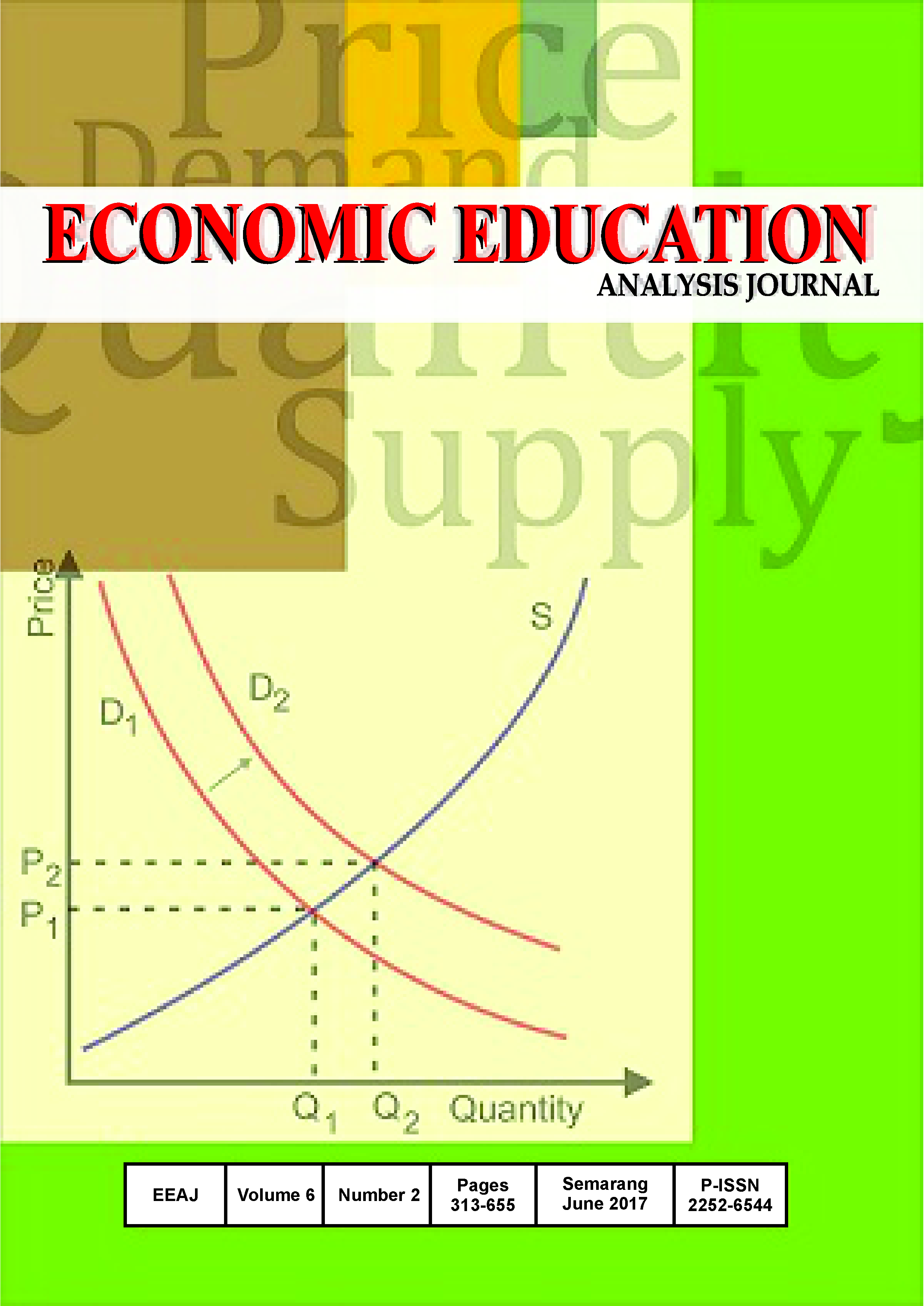PENGARUH KEMAMPUAN EKONOMI ORANG TUA TERHADAP HASIL BELAJAR MELALUI FASILITAS BELAJAR DI RUMAH DAN MOTIVASI BELAJAR SEBAGAI INTERVENING
Main Article Content
Abstract
Tujuan penelitian ini untuk menganalisis pengaruh langsung kemampuan ekonomi orang tua terhadap hasil belajar pengantar akuntansi maupun pengaruh tidak langsung melalui fasilitas belajar di rumah dan motivasi belajar.Populasi penelitian ini adalah seluruh siswa kelas X Akuntansi SMK PGRI 3 Randudongkal berjumlah 110 siswa. Metode pengumpulan data menggunakan angket dan dokumentasi. Metode analisis data yang digunakan adalah analisis statistik deskriptif dan analisis jalur dan uji sobel. Hasil penelitian menunjukkan bahwa terdapat pengaruh secara langsung kemampuan ekonomi orang tua, fasilitas belajar di rumah, dan motivasi belajar terhadap hasil belajar pengantar akuntansi secara berturut-turut sebesar 27,9%, 17,3%, dan 44,6%. Sedangkan pengaruh kemampuan ekonomi orang tua secara tidak langsung melalui fasilitas belajar di rumah dan motivasi belajar secara berturut-turut sebesar 11,1% dan 12,3%. Pengaruh fasilitas belajar di rumah terhadap hasil belajar pengantar akuntansi melalui motivasi belajar sebesar 17,6%. Total pengaruh kemampuan ekonomi orang tua terhadap hasil belajar pengantar akuntansi melalui fasilitas belajar di rumah dan motivasi belajar secara berturut-turut sebesar 39,0% dan 40,2%. Total pengaruh fasilitas belajar di rumah terhadap hasil belajar pengantar akuntansi melalui motivasi belajar sebesar 34,9%. Berdasarkan hasil penelitian di atas, dapat disimpulkan bahwa kemampuan ekonomi orang tua, fasilitas belajar di rumah serta motivasi belajar berpengaruh positif terhadap hasil belajar pengantar akuntansi baik secara langsung atau pun tidak langsung. Saran yang dapat diberikan adalah pihak orang tua mampu mengoptimalkan penggunaan kemampuan ekonomi orang tua untuk meningkatkan hasil belajar pengantar akuntansi. Para guru hendaknya mampu menciptakan kondisi belajar yang mampu meningkatkan hasil belajar siswa.
The purpose of this study were to analyze the direct effect of parents’ economic capacity toward learning outcome or indirect effect through learning facilities at home and learning motivation. The population of this study was all students of class X Accounting SMK PGRI 3 Randudongkal, they were 110 students. The methods of collecting data used questionnaire and documentation.The methods of collecting the data were descriptive statistical analysis and path analysis and sobel test. The results showed that there is a direct effect of the parents’ economic capacity, learning at home, and learning motivation towards learning outcomes of introductory accounting respectively 27.9%, 17.3% and 44.6%. While the parents' economic capacity indirectly effects through learning facilities at home and learning motivation, respectively 11.1% and 12.3%. the Effect of learning facilities at home, learning outcomes of introductory accounting through learning motivation was 17.6%. The total effect of the parents’ economic capacity to the learning outcomes of introductory accounting through learning facilities at home and learning motivation in a row amounted to 39,0% and 40,2%. The total effect of learning facilities at home toward the learning outcomes of introductory accounting through learning motivation was 34,9%. Based on the results above, it can be concluded that the parents’ economic capacity, learning facilities at home as well as the learning motivation have a positive effect on learning outcomes of introductory accounting either directly or indirectly. Suggestions can be given are the parents are able to optimize the use of the parents’ economic capacity can improve learning outcomes of introductory accounting. Teachers should be able to create learning conditions that can improve students’ learning outcomes.
